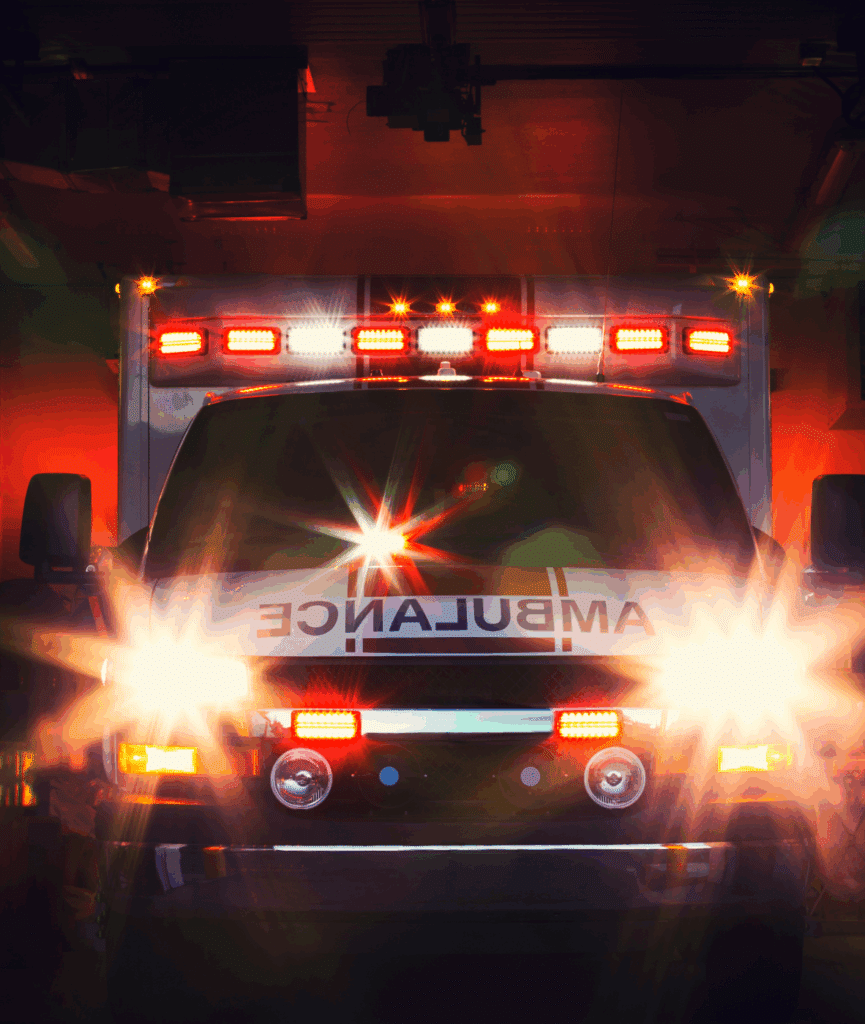Mental Health Referrals From First Responders: Support During Crises to Continued Care

Even with the help of trained professionals and first responders, mental health emergencies can be extremely distressing. If you or someone close to you has a mental health crisis and you reach out to emergency services, you may receive a referral to other care providers.
If you’re not sure how referrals to mental health services work, this experience may be even more confusing and stressful. A mental health professional can help you understand the process and guide you through it. This page can also make the process of mental health referrals from first responders clearer by exploring:
- When to call 988 vs 911 in a mental health crisis
- Types of first responders that provide support in a mental health crisis
- What first responders do to de-escalate crises and how they handle referrals
- Tips for navigating a mental health referral from first responders
- Different types of continued care after mental health crises

When to Call 911 vs 988 in a Mental Health Crisis
The 988 Suicide & Crisis Lifeline used to be the National Suicide Prevention Lifeline. It’s for people experiencing a mental health crisis. For example, they may be in emotional distress, want someone to talk to, or need somewhere to go. The 988 lifeline can connect them to a trained counselor who can listen to what they’re going through and provide helpful resources.
988 counselors may connect you to emergency services, but only if it’s absolutely necessary. In fact, only 2% of their calls involve local emergency services, and more than half of those are with the consent of callers. This means that 98% of calls to 988 are resolved without involving other services.1
Previously, there were many calls to 911 that didn’t actually involve an immediate danger to life, because callers didn’t have anyone else to call. But now, 988 can be called in mental health emergencies that do not threaten life. This frees up valuable resources for dealing with life-threatening situations.
However, you should call 911 if a mental health crisis is posing serious danger to someone’s life (whether that’s yours or someone else’s). For example, if there is a suicide attempt in progress or if someone is acting in a threatening or violent way.
In a crisis, calling 911 connects you to first responders such as the police, the fire department, or paramedics. They’ll need to know the details of the situation and your location. Yet, if you call 911 and they decide there’s no immediate threat to life, they may redirect your call to 988.
How Are Mental Health Crises Handled?
What constitutes a mental health crisis can vary from person to person. However, in general, it means someone has become very unwell and in need of professional services.
It may be a mental health crisis if someone is:
- Thinking about suicide or acting on suicidal thoughts
- Having an episode of psychosis or mania
- Acting in a way that puts themselves or others at risk of harm
As mentioned, if you call 988, you’ll be able to speak to a counselor about what you’re going through. However, if you call 911 or are put in touch with your local emergency services, you may receive in-person crisis care. The following section discusses the type of emergency responders you may encounter from calling 911.
Types of Emergency Responders
Police officers should only be involved if there’s an immediate safety concern. For example, if there’s violence, weapons, or unsafe circumstances. Police involvement can be distressing, but usually they work alongside mental health specialists to ensure crises are handled with the right support.- Paramedics may be involved if medical assistance is required.
- Mobile crisis response teams are sometimes paired with paramedics and are typically mental health professionals.2
Ideally, mental health crises will be supported by mental health professionals because they’re trained to respond sensitively. They’ll be more focused on care than enforcement, but they’ll handle things differently depending on what’s happened. Additionally, police officers and paramedics are often trained in mental health to enable them to respond to situations with understanding and compassion.
The Crisis Stabilization and Referral Process
Next, they’ll want to stabilize the crisis. Crisis intervention may involve responders establishing a rapport with you, gaining an understanding of your feelings, exploring coping strategies, and making a plan. After this, they may connect you with a loved one or arrange transport to the emergency department.3
Once the crisis is stabilized, there may be a referral to treatment. This could be a mental health clinic, psychotherapist or counselor, psychiatrist, or even a peer support program.
In order to refer you, they may give you a number to call or a written referral. Other times, they’ll be more actively involved and either help schedule an appointment or pass your information to a care provider directly, who will follow up with you.
Mental Health Referrals From First Responders: What They Look Like
It’s very important that mental health crises are stabilized because de-escalation prevents them from getting worse and becoming more harmful to the people involved. As mentioned, there are many different ways referrals can be handled. First responders are likely to discuss your care with you, gain your consent, and check what sort of support you would like.
If the first responders believe your crisis can be handled without heavy intervention, they may simply give you the details for local mental health services. When first responders refer to therapy services in this way, you’re free to follow up at your own pace.
However, they may believe you’d benefit from more hands-on intervention. This is when they’ll schedule the appointment for you. If they conclude you need immediate support in a clinical setting, they’ll likely transport you there themselves.
Even if police are involved in your crisis support, this doesn’t mean you’ll go into custody. Instead, you’ll likely still be referred in one of the ways above so that you receive mental health care after police intervention. Police custody is a last resort, like when a crime has been committed or if there’s a risk to life that can’t be handled in the ways discussed. In general, the focus will always be on taking the right steps to protect and safeguard well-being.
How You Might Feel During the Referral
Experiencing a mental health crisis is clearly distressing. For example, you may find it hard to trust the first responders when they’re unfamiliar to you. Or you might worry about what will happen to you and how much control you will have over the situation.
If you’re experiencing a mental health crisis, you should try to communicate your needs and feelings as clearly and calmly as possible. If there’s someone you trust who understands what you’re going through, you could ask the responders to contact them. It may be easier if a friend or family member who’s not in crisis can advocate for you.
You are entitled to be treated with dignity and to be involved in decisions concerning your treatment. If the responders decide to transport you somewhere, you may want to ask specific questions about where you’re going. You can also ask questions about your referral and request a follow-up.
Continued Mental Health Care After Mental Health Crises
After the crisis has been stabilized and you’ve been referred to a mental health service, treatment tends to have a few specific aims. These are likely to be:
- Finding out what caused the crisis
- Recovering from the initial shock of the crisis and determining if you’ll be a risk to yourself or others
- Processing and addressing the cause of the crisis. For example, (oftentimes, big life changes can trigger symptoms of mental health conditions
- Diagnosing any present mental health conditions
- Determining if you’d benefit from medication
- Finding the right sort of long-term support, whether it’s one-to-one, residential, or group therapy
Therapy options for emergency mental health needs are varied. You may be referred to a provider of talking therapy, which could be humanistic or psychodynamic. These therapists won’t diagnose you, but they’ll listen to your feelings and life history to understand what’s led to the crisis. They’ll also likely provide a validating space for you to process and find your own coping strategies for the future.
However, if your treatment involves a psychiatrist, you may receive a diagnosis and prescription for medication if required.
Emergency referrals may also involve residential therapy programs, which can be extremely helpful for people who need more involved support. Inpatient treatment referrals from police or EMTs will be for those who could benefit from closer monitoring, a calm environment, and frequent access to therapy.
If you’ve experienced traumatic events and these are contributing to your crisis, you’ll most likely need trauma-informed care from your first responder referral. This means you’ll be treated by specialists who understand the unique impacts of trauma on mental health, and get the most relevant support.
Mission Connection: Professional Support After a Mental Health Crisis
At Mission Connection, we offer both inpatient and outpatient treatment options for people after mental health emergencies. With many types of therapies on offer, as well as medication management and personalized care, we’ll work with you to give you the support you need.
If you’re concerned about your well-being or that of someone you care about, don’t hesitate to get in touch to learn about our services.

References
- Sherwood, A. (n.d.). What Happens When You Contact 988 About Suicide? WebMD. https://www.webmd.com/mental-health/features/988-suicide-prevention-overview
- Mental Health America. (n.d.). Responding to behavioral health crises. Mental Health America. https://mhanational.org/position-statements/responding-to-behavioral-health-crises/
- Wang, D., & Gupta, V. (2023). Crisis intervention. StatPearls Publishing. https://www.ncbi.nlm.nih.gov/books/NBK559081/
